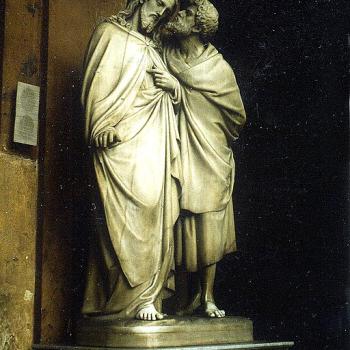My eleven-year-old son put it better than anyone I have ever heard.
Homeschoolers socialize with other homeschoolers. We took our kids to movies together, enrolled them in activities that ranged from classes at the local science museum to participation in swim teams, homeschool soccer leagues and even a homeschool chess club.
We also had picnics, went to movies and other recreational activities.
It was after a homeschool picnic that my son gave me the best description of God’s viewpoint of us that I’ve ever heard.
We were full of food and feeling mellow and we got into a discussion of the first chapter of Genesis. We were all, including the kids, just kicking it around, expressing our own views. One of the homeschooling mothers took an absolutely literal, and, to me at least, narrow and inaccurate, view of the first chapters of Genesis. She believed that God had created the earth (and presumably the whole universe) in six twenty-four hour solar days.
I kept raising the buts inherent in her argument … but 24 hour days are based on how long it takes the earth to turn on its axis, and there was no earth and no sun “in the beginning,”
… but God created time, so in the beginning there was no time …
… but …
She would have none of it. She couldn’t wrap her mind around the idea that there was once nothing, absolutely nothing, and God created all creation out of this nothingness.
To her, and a lot of other people on both sides of the existence-of-god arguments, the idea of a beginning in which light, time, atoms, the rules of physics — everything, everywhere — simply did not exist was too incomprehensible to bother considering.
My eleven-year-old piped up, “but God created time,” he said. “God is not part of time. When God looks at creation, He doesn’t see a line, going off into the future. He sees a dot.”
My son’s comment didn’t make a ding in our friend’s thinking. It floated past her without engaging one brain cell.
But I was stunned by the simple understanding of an eleven-year-old.
He had said it all.
When scientists taught that the universe always was, they were dodging the obvious. The metaphysical implications in an existence which began from nothing are enormous.
If everything — everything — had a beginning, and that beginning was a sudden something when nothing exploded into all that is, then the question of “What, or Who, did this?” comes shortly after.
I’ve read comments about the discovery of the Big Bang Echo to the effect that the Big Bang Echo debunks the Biblical story of creation once and for all. I assume that by the Biblical story of creation they were referring, not to the Scriptures themselves, but to interpretations of those Scriptures like that of my fellow homeschooler.
The idea that God created the universe in seven 24-hour solar days has so many holes in it, from simple logic, that it won’t stand. If you read the thing literally, really literally, you’ll see that it doesn’t say any such thing. It says “day” and day, used this way, is poetic. It can mean almost any space of time.
The first chapter of Genesis is a poem. Anyone can see that. It’s what it is.
But it also describes, in poetic rather than scientific terms, a reality. God did create the heavens and the earth. He “spoke” existence into existence.
The discovery of the Big Bang echo doesn’t prove that. It doesn’t even address it.
What it does do is let us see it.
As my eleven-year-old son once said, God created time. He is outside time the same way that Henry Ford was outside and not part of the Model T, that I am outside and not part of this blog post. Mr Ford and I both leave our signatures all over our creations. There is an image of us in what we do. But we are not governed by the realities of what we have created. It is governed by us.
God created time just as He created everything else. He is outside of it. I think that when God looks at creation, he sees all of it, all at once, all the time.
When it comes to time, we, who are in it and of it, are like a grasshopper, standing in the middle of an interstate highway. From our vantage point, the highway of time goes on in both directions forever. It has no beginning and no end. But to God, Who is outside of time, the beginning, and the end, are both constantly in view.
That is what it means to be transcendent.
We, who are made in the image and likeness of God, possess the capacity to slowly and painstakingly unravel this mystery of how God did it. From inside our temporal prison, we can, by use of all our wits and by building on one another’s thinking, figure it out.
I believe that’s because we are made for more than this life. Where else did this drive to touch the face of God with our minds come from? What practical purpose does it serve for us to seek and find the echo of the Big Bang from which we came? We are made for more than what we appear to be. Our craving for transcendence is a hunger that we feed but cannot satisfy with the devices of our minds.
What we are hungering for is not the what of existence, but the Who that is behind it.
This Being Who spoke existence into existence, this Word that was there from the beginning, loves us. He left us clues to how He did it scattered throughout creation like Hansel and Gretel’s bread crumbs.
The Big Bang echo is one such crumb. It allows us, for the first time, to see creation as it was created. That is its significance. And its gift.
Science is not the enemy of faith. Ham-handed fools who try to use science to “prove” their personal prejudices can make it seem to be the enemy of faith. Occasional misapprehensions of the partial discoveries we make as we follow the bread crumbs can yield to this hubris and, again, make science seem like the enemy of faith.
But in truth, science is just us, figuring out the creation we’ve been handed.
Science misapplied can be our undoing, both spiritually, and, as we meddle deeper into the building blocks of our existence, physically. We can blow ourselves up or mutate our genes and end ourselves with science. The threat is right in front of us every day we live.
That’s because science is our creation, and as our creation, it is flawed in the ways that we are flawed. It a tool that our tool-making kind has devised to help us understand How He did it. Nothing more. Nothing less.












